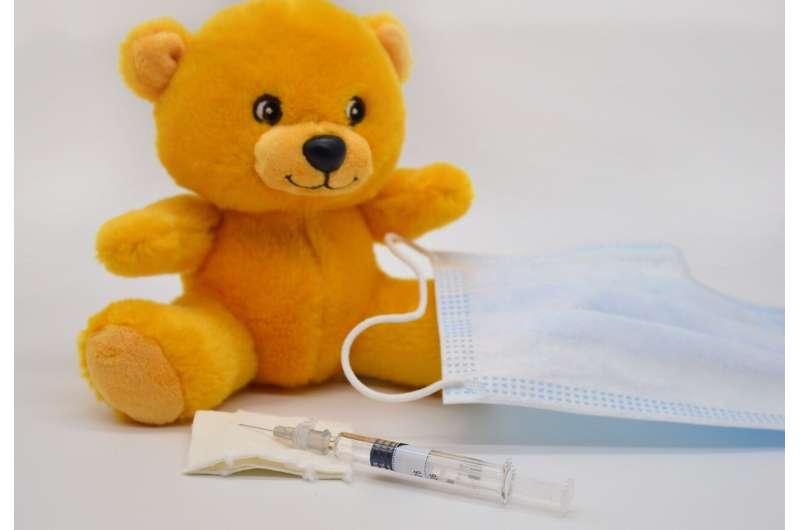This article has been reviewed according to Science X's editorial process and policies. Editors have highlighted the following attributes while ensuring the content's credibility:
fact-checked
peer-reviewed publication
trusted source
proofread
Professors examine ethics of age de-escalation in pediatric vaccine trials

Many vaccine trials use age de-escalation with the goal of safeguarding the interests of younger, more vulnerable populations. After a vaccine's safety and efficacy are established in adult populations, progressively younger cohorts are enrolled and studied. Although age de-escalation approaches are widely used, including in the recent development of pediatric COVID-19 vaccines, ethicists have not comprehensively addressed the benefits and risks of such approaches.
Oakland University Professors Ami Harbin and Mark Navin, with University of Michigan Professor Naomi Laventhal, M.D., have co-authored an article titled "Ethics of age de-escalation in pediatric vaccine trials: Attending to the case of COVID-19," which appears in the journal Vaccine.
Focusing on pediatric COVID-19 vaccine development as a key case study, the article delineates important ethical factors to consider when employing age de-escalation. The researchers clarify the benefits, risks, and trade-offs involved in age de-escalation approaches and call for the development of evidence-based best practice guidelines that can help policymakers more effectively protect the health and well-being of children in pediatric vaccine trials.
"In the development of the COVID-19 vaccines, infants, toddlers and preschoolers were the last to receive access to the vaccines, and for many families the wait felt very long," said Dr. Ami Harbin, the study's lead author. "We want to help make sure researchers and pharmaceutical companies have the resources they need in advance of future vaccine development, to design trials in ways which will prioritize the development of safe and effective vaccines for all ages, in as efficient a manner as is appropriate."
The researchers acknowledge ethical advantages to using age de-escalation in pediatric vaccine trials. There is a moral imperative to protect children from the uncertainties of novel interventions. Also, since children are unable to provide informed consent, they should not be subjected to the same level of risk as consenting adults.
However, the researchers contend that the benefits of age de-escalation approaches should be weighed against potential drawbacks. The article presents a number of ethical concerns to consider when performing this risk-benefit analysis. Examples include "tension of protection," which refers to the competing interests of protecting children from potential risks associated with vaccine studies and protecting them from diseases that new vaccines are designed to guard against; the "moving target problem," which can occur when dominant variants of a virus change in the time it takes for younger children to be enrolled in a vaccine trial; and the problem of "narrow conception of risk," which happens when certain risks are emphasized while others are perceived to be less important.
In the case of COVID-19, the researchers note that risk/benefit analyses of the vaccine were more heavily focused on physical health concerns, rather than those related to education and social well-being.
More information: Ami Harbin et al, Ethics of age de-escalation in pediatric vaccine trials: Attending to the case of COVID-19, Vaccine (2023). DOI: 10.1016/j.vaccine.2023.01.055





















